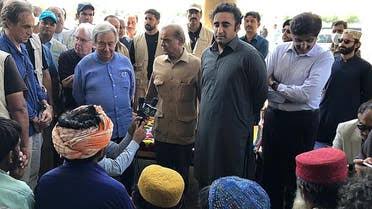Sukkur: United Nations Secretary General Antonio Guterres visited the flood affected areas of Sindh and Balochistan.
Prime Minister Shahbaz Sharif and United Nations Secretary General Antonio Guterres visited the flood-affected areas of Sindh. He met the flood victims and reviewed the relief operations. Sindh Chief Minister gave him a detailed briefing at Sukkur Airport.
During the flight, the Prime Minister and the Secretary General also made an aerial inspection of the flood affected areas. The Secretary General described the devastation caused by the floods as “unimaginable”.
Antonio Guterres said that the recent floods in Pakistan have undoubtedly caused a lot of damage to precious human lives, property, livestock and employment, but hopes are alive and hopes have not been harmed. We need a sustainable and strong infrastructure to deal with the devastating effects, for this the international community and financial institutions should play their role.
The Secretary General said that he has taken a self-assessment of the damage caused by the flood, to avoid climate change and damage, we must immediately reduce the emission of gases that harm the environment by 50%.
The Secretary General of the United Nations said that the international community and institutions need Pakistan’s generous assistance and support, because Pakistan is among the top 50 countries affected by climate change, although Pakistan’s share in the emission of gases that harm the environment is very small. It demands that Pakistan be given maximum aid and support so that it can establish a sustainable infrastructure to withstand the effects of climate change.
Chief Minister Sindh Murad Ali Shah gave a detailed briefing to the Prime Minister and the Secretary General of the United Nations about the damage caused in the rural and urban areas of Sindh due to the recent rains and floods.
Chief Minister Sindh said that after the recent rains and floods, relief operations are going on, but the challenge we are facing is very big. At present, 6.6 feet of water is standing in many areas, we need trillions of rupees for relief and rehabilitation, while our resources are limited.









